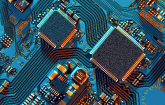DALLAS, Sept. 23, 2014 /PRNewswire/ -- As part of its commitment to promoting effective teaching and science, technology, engineering and math (STEM) education, the Texas Instruments (TI) Foundation presented its Innovations in STEM Teaching Awards today to 14 teachers from the Dallas, Mesquite, Plano and Richardson Independent School Districts (ISDs) at a ceremony at TI's Dallas headquarters.
Since 2007, the TI Foundation has invested $900,000 in the STEM Awards to recognize and help retain 90 excellent teachers in these North Texas school districts.
The awards honor local secondary math and science teachers who consistently demonstrate quality instruction and build student achievement in the STEM subjects. Each honoree receives $10,000, of which $5,000 is directly awarded to the teacher. The other $5,000 is to be used at his or her discretion for professional development or instructional technology. The grants are awarded through the Richardson ISD Excellence in Education Foundation, the Plano ISD Education Foundation, the Mesquite ISD Education Foundation and the Dallas Education Foundation.
"We are proud to recognize the achievements these teachers are making in the classroom, and we truly value the important work they are doing," said Ann Pomykal, TI Foundation director of major education gifts. "Without effective STEM teachers, students might not see the relevance of these disciplines to their future."
"We focus our support on teacher effectiveness as a key strategy to improving student achievement in math and science. We're especially passionate about reaching girls and minorities who are underrepresented in STEM careers in North Texas as well as throughout the country," she said. "These teachers are creating a better future by making the STEM fields exciting and accessible to all students."
Principals nominate teachers for the STEM awards based on criteria, such as demonstrating and documenting teaching effectiveness, establishing classroom innovation, participating in education activities outside the classroom, and encouraging curiosity and increasing interest in STEM subjects among students. Teams within each district review the applications and make classroom observations. A list of finalists is then submitted to the districts' foundations, and winners are selected.
The 14 TI Foundation STEM Award recipients for 2014 are:
Dallas ISD
Thelvie Cullins, School for the Talented and Gifted, teaches math. Cullins' mantra is "Learn math. Don't memorize it." He has designed his own curriculum and teaching materials from scratch and structures his class in a way that rewards student perseverance and learning from mistakes. His students regularly receive outstanding scores – 85 percent of his students scored 3+ on their AP exams, versus 40 percent for the district overall.
Elizabeth Jordan, Emmett J. Conrad High School, teaches engineering. By applying her experiences in the engineering business world, Jordan brings that world into her classroom. She started a robotics program a few years ago with minimal supplies. Today, she has a full functioning engineering lab where students create and build robots to perform tasks identified during their research.
Lashonda Roberson, Raul Quintanilla Sr. Middle School, teaches science. Roberson routinely has her students work with technology to compute, analyze and present information. She introduces fun, interactive, research-based replications of physical phenomena designed to enable students to connect real-life occurrences with the underlying science.
Dr. Durgha Shanmugan-Johnson, Hillcrest High School, teaches science. The effectiveness of Dr. Shanmugan-Johnson's physics classes lies in her ability to motivate students to use analytical and graphical methods in collaboration with surrounding technology to navigate through scientific principles.
Brian Romero Smith, Harry Stone Montessori Academy, teaches middle school technology and computer science. With his philosophy of "Meet Them Where They Are," Smith uses tools that students are already excited about like mobile phones to create a classroom that engages even the most reluctant students.
Kristopher Stewart, Francisco Medrano Middle School, teaches math. In his single-gender classroom of boys, Stewart appeals to his students' competitive and active nature by engaging them in physical competitions, such as math relay races to drive interest and active engagement to foster a strong desire to learn.
Saniyyah Thomas, James Madison High School, teaches chemistry. Thomas' students attained a 96 percent passing rate on the Chemistry 2013 end-of-course (EOC) exam for which district and state averages were below 70 percent. For two years in a row, her students scored the highest passing percentage in their division on the district's standardized Pre-AP Chemistry finals.
Mesquite ISD
Melissa McGee, Dr. Ralph H. Poteet High School, teaches biology. Because she is willing to try almost anything to engage her students, McGee's classroom is an adventure for students. Her Sunday afternoons are often spent in her classroom setting up labs, rearranging the room for effect for a certain lesson or organizing elements of a project so her students will have hands-on experiences.
Mark Wilburn, Vanston Middle School, teaches science. With labs he creates, fun videos that tie into the lesson, unique review games, classroom decor, silly jokes and songs, Wilburn entertains and captivates them into learning. Based on district tests, his students outperform nearly every other class in the city.
Plano ISD
Deanna Shea, Shepton High School, teaches science. To promote a love and natural curiosity for science, Shea's classroom displays fake body parts, shark jaws, frogs and pigs. She provides hands-on experiences, meaningful discussions and inquiry that help students grow in their learning. Her students have excelled nationally for their work with the science fair.
Heather Simpson, Robinson Middle School, teaches science. Each day, Simpson strives to transfer her excitement for science to her students. With engaging lessons and collaborative activities that challenge her students to think at the highest level, Simpson makes sure all of her students are successful. Outside the classroom, Simpson serves the district as a campus coordinator for the science fair. Under Simpson's leadership, her school's participation in the science fair has increased significantly.
Dusty Vincer, Plano East Senior High School, teaches biology. When asked what is distinctive about her higher-level biology classes, Vincer's students said "class is very hands-on. We have a casual setting that is comfortable and conducive to learning and speaking freely. Visual learning is combined with technology and labs. Class is structured and organized to help me see the big picture before we get into the smallest, most specific details."
Richardson ISD
Ann Bailey, Richardson North Junior High School, teaches math. Bailey's creative, fun and inspiring teaching clearly produces results: she has the highest Algebra 1 student passing rate on state and district assessments, including all the high schools. To put it into perspective, for the last two years, all of her students passed their EOC and Texas Assessment of Skills and Knowledge (TAKS) tests. In fact, her eighth graders did better than the district's ninth graders.
Lauren Gay, Richardson High School, teaches math. Gay works to ensure her students are prepared for a technologically-advanced and math-based world by using many resources to interact and engage all types of learners. She stresses how to apply math in the real world and exposes her students to possible future careers where those skills will be required.
The STEM Awards are just one of many initiatives of the TI Foundation, which has led and supported innovative education programs for decades. Education is the Foundation's primary philanthropic focus, with grants specifically enhancing STEM education and supporting effective teaching.
Innovation and technology change have led to demand for STEM competencies beyond traditional STEM occupations – skills necessary for innovation are scattered across a wider swath of the economy.
"These teachers are instilling in their students a passion for new ideas and a desire to solve tough technical challenges. Most importantly, they are preparing the next generation of innovators," Pomykal said.
About the Texas Instruments Foundation
The Texas Instruments Foundation, founded in 1964, is a non-profit organization providing philanthropic support for educational and charitable purposes primarily in the communities where Texas Instruments operates. Committed to supporting educational excellence, the foundation works to create measurable, replicable programs and initiatives. The focus is on providing knowledge, skills and programs to improve STEM education and increase the percentage of high school graduates who are math and science capable. More information can be found at http://www.ti.com/education
SOURCE Texas Instruments
WANT YOUR COMPANY'S NEWS FEATURED ON PRNEWSWIRE.COM?
Newsrooms &
Influencers
Digital Media
Outlets
Journalists
Opted In





Share this article